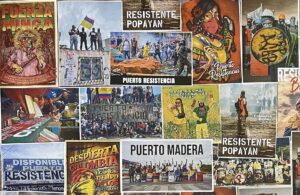 In April 2021, tens of thousands of people took to the streets in Colombia to demand change. They rejected decades of state violence and deepening inequality. Over the course of three months, the largest protest in Colombian history spread to over 800 municipalities throughout the country. The months-long protests played a huge role in creating the conditions for the election of Gustavo Petro and Francia Marquez.
In April 2021, tens of thousands of people took to the streets in Colombia to demand change. They rejected decades of state violence and deepening inequality. Over the course of three months, the largest protest in Colombian history spread to over 800 municipalities throughout the country. The months-long protests played a huge role in creating the conditions for the election of Gustavo Petro and Francia Marquez.
Changes are afoot in Colombia, and the inauguration of President Gustavo Petro and Vice President Francia Marquez on August 7 marks an important shift away from decades of political repression. However, more than 300 people accused of participating in the 2021 protests still remain locked up and/or are facing harsh sentences on trumped-up charges.
Even after the activity on the streets faded, the state continued to persecute and prosecute the people it believed to be involved in the demonstrations. Authorities are trying to discourage future protests by condemning the participants in the 2021 protests to long sentences. The dismal conditions and overcrowding in Colombia’s prisons aggravate this explicit form of intimidation and repression. For example, on May 31, 2022, a prison fire in Tulua (Valle del Cauca) killed over 50 people, including one political prisoner from the uprising. [Read more]
